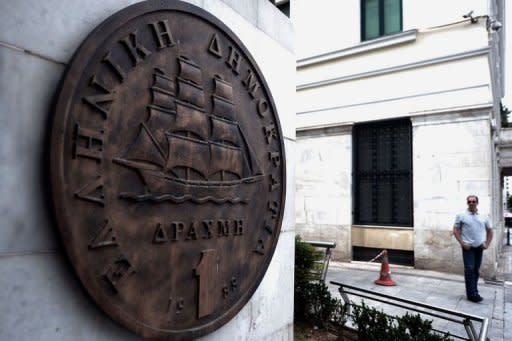Greek president calls for technocrat government
Greece's president called Monday for talks on a technocrat government, seeking to resolve the crisis over a tough EU-IMF debt bailout which risks forcing the country into new elections and out of the eurozone. Socialist Pasok party chief Evangelos Venizelos said after meeting President Carolos Papoulias along with leaders of the conservative New Democracy and radical Democratic Left that the talks would take place at 1100 GMT on Tuesday. The meeting would seek to form a government of "distinguished and non-political figures," said Venizelos, who with New Democracy in a technocrat coalition last year implemented the bailout whose austerity measures Greek voters largely rejected in May 6 polls. Antonis Samaras of New Democracy said: "Everyone must take their responsibilities ... our efforts continue tomorrow. "Our mandate all together is to build a government," Samaras said. Democratic Left head Fotis Kouvelis, who had earlier Monday said there was no chance of a deal if the radical left Syriza party was not included, indicated he would go to Tuesday's meeting. Syriza head Alexis Tsipras said he would also attend while NET TV reported that the Greek Independent party had agreed to take part, meaning only the hardline Communists (KKE) and far-right Golden Dawn would be absent. A meeting Sunday hosted by Papoulias with Samaras, Venizelos and Kouvelis failed, raising the prospect that Greece would spend another month it could ill afford without action in the hope that new polls would produce a solution. The latest twist in a tortuous Greek crisis coincided with a eurozone finance ministers meeting in Brussels where officials insisted Greece must accept the bailout in full or face the consequences, a likely exit from the 17-nation euro currency bloc. Euro chief Jean-Claude Juncker said after the meeting that currency partners unanimously affirmed their "unshakeable desire" to keep Athens in the club. He insisted: "I don't envisage, not even for one second, Greece leaving the euro area." Earlier Monday, Germany, the eurozone's paymaster and biggest economy, said that forming a government was the most important concern and stressed that there could be no relaxation in the Greek bailout terms. "For the German government, the most important thing is that the political forces succeed in consolidating themselves into a workable majority, a workable government," German government spokesman Steffen Seibert said in Berlin. Head of the European Commission Jose Manuel Barroso meanwhile expressed the hope Greece could stay in the eurozone but Athens had to live up to its commitments, his spokeswoman Pia Ahrenkilde Hansen said. New Democracy and Pasok backed the 240 billion euro ($310 billion) EU and International Monetary Fund debt deal agreed last year and approved by parliament as part of a technocrat government led by Lucas Papademos. Monday's developments seem like an attempted return to that solution which at least proved stable long enough to get the debt deal through but the political landscape is now very different. Syriza has capitalised on the groundswell of frustration in Europe with governments which put austerity before growth, demonstrated only last week in France where Socialist Francois Hollande ousted President Nicolas Sarkozy largely on his pledge for change. Syriza, which says it wants to remain in the eurozone, is widely tipped to emerge as the largest single party if Greece has to go to the polls again, threatening to prolong a crisis which has rumbled on since early 2010. Greece has had to be bailed out twice, followed by Ireland and Portugal in its wake to stoke fears debt contagion could spread to Spain and even Italy. European stock markets slumped Monday on such concerns, extending heavy losses, with Athens down 4.56 percent, while Wall Street also lost ground on the view that Greece is slipping out of the eurozone with potentially disastrous consequences far and wide. "Greece's time in the euro seems limited now, and a large bill for their default will need to be paid and Germany's (share) ... will be large enough to shake the eurozone further," said broker Jonathan Bristow at Valbury Capital. "While a Greek exit might actually be a good thing for the eurozone in the long run ... in the short term however there is uncertainty regarding how much damage a Greek exit would actually cause," ETX Capital trader Markus Huber said. Greeks appeared sceptical and uncertain of what is ahead. For unemployed Velisarios, who has a degree in economics, Greece wants it both ways -- "to remain in the eurozone but not have the loan agreement. "That is what the majority wants ... (but) of course, something like that can't happen," he said. Venizelos said that with the country in "such a dead end," the technocrat option seemed the best in the circumstances. "As a last resort we support a government of personalities. In a democracy, the responsibility belongs to the political governments, political parties and politicians," he said. "It is not normal to form a governments by technocrats and personalities. "However, when we face such a crisis, in such a dead end that is something we have to accept but it is important the parliamentary support of this government is a great as possible," he said.




